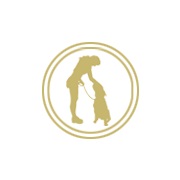Privacy Policy: Your email address is 100% safe.
We don't spam and hate it as much as you do :-) You can also unsubscribe from our mailing list at any time.
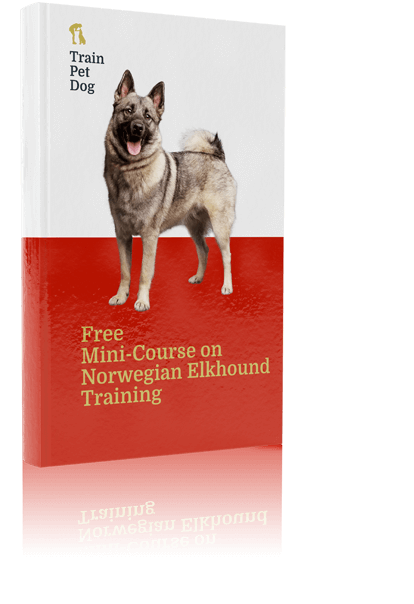
Sign Up
Norwegian Elkhound: Origin, Temperament, Training, Exercise
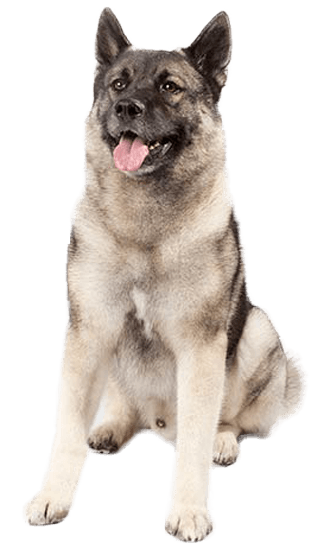
Country of Origin, History of Norwegian Elkhounds
The Norwegian Elkhound is an Arctic breed that originated in Norway as early as 5000 B.C. Remnants of Norwegian Elkhounds dating back centuries have been found with Viking remains and weapons, a testament to their importance in the Nordic culture. The breed was used to hunt moose, elk, bear and other wild animals.
The Norwegian Elkhound can scent (smell) game from a distance of several Kilometers. He tracks the quarry and attracts its attention by barking. Then he holds the animal at bay until the hunter arrives to make the kill. Over the centuries, Elkhounds have also successfully hunted badger, lynx, mountain lion, bear, wolf, reindeer, elk and even rabbit. The Elkhound is particularly well-suited to badger hunting since he works better at night than in the daytime. He is also highly prized as a sled dog.
In more recent times, the friendly and reliable character of the Elkhound has helped win him a place in many homes as a cherished family pet. The breed was first exhibited in 1877 when the Norwegian Hunters Association began holding shows.
As a hunter, the Norwegian Elkhound has the courage, agility and stamina to hold moose and other big game at bay by barking and dodging attack, and the endurance to track for long hours in all weather over rough and varied terrain.
Norwegian Elkhound Tools
Breed Selector Tool - is the Norwegian Elkhound the right breed for you?
Is the Norwegian Elkhound the right breed for you and your family?
Find out by using our Free Dog Breed Selector Tool
Check Your Norwegian Elkhound's Learning Style
Are you aware dogs also have a learning style that can greatly affect their ability to housetrain as well as be trained correctly. Evaluate your Norwegian Elkhound's learning style and personality using our free Learning Style tool so that you are better able to provide him with the proper Norwegian Elkhound training methods.
Is your Norwegian Elkhound dominating over you?
Does your Norwegian Elkhound bark unnecessarily? Does your Norwegian Elkhound come to you when you call? Download a FREE Report on Dog Dominance for you and your Norwegian Elkhound and learn how to control your dog.
Do you make these mistakes with your Norwegian Elkhound?
Are you inadvertently snow-balling bad behavior in your Norwegian Elkhound? Evaluate your Dog Training Style from our Free Tool and learn how best to deal with your dog.
Norwegian Elkhound Calorie Calculator
Do you know how many calories your Norwegian Elkhound needs every day and how many cups of food you should be giving it every day? Click here to use our Norwegian Elkhound Calorie Calculator.

A General Appearance of the Dog
The Norwegian Elkhound is a hardy, medium-sized hunting dog, sturdy and squarely built, with the stamina to hunt all day long for days at a time.
The stand-off double coat has a distinctive gray color with a lighter undercoat and undersides. The coat on the legs is very dense. It protected them in the cold winter months of their homeland. The head is broad and wedge-shaped with a strong jaw line. The muzzle, ears and tail tip are black. The Norwegian Elkhounds’ ears are pointed, known as “prick” and are very mobile. The eyes are very dark brown with a keen, friendly expression. The tail is rolled tightly and carried over the back. The breeds’ body is relatively short and appears to be broader than it actually is, due to its dense coat.
Coat Color
The double coat of the Norwegian Elkhound comes in a mix of silver, black and gray.
The body of the breed is light silver at the base, or under coat of the dog, and grows to a darker grey becoming black at the tip of the longer guard hairs. The gray body color is darkest on the saddle, lighter on the chest. The Norwegian Elkhound has a distinctive harness mark (a band of longer guard hairs from shoulder to elbow) adding to its distinctive appearance.
The muzzle, ears and tail tip are black. The black of the muzzle shades to lighter gray over the forehead and skull.
Coat Type
The double coat of the Norwegian Elkhound is indicative of its northern roots and serves to keep this breed protected and insulated.
The shorter undercoat is dense, soft and woolly and contains essential oils that provide insulation against harsh weather.
The longer guard hairs that make up the second part of the coat whisk away snow and other matter, keeping it from lodging in the second coat. These longer guard hairs also give the breed’s coat its distinctive look and should not be trimmed away.
Height
Males: 19-21”
Females: 18-20”
Weight
Males: 50-60 Lbs.
Females: 40-50 Lbs.
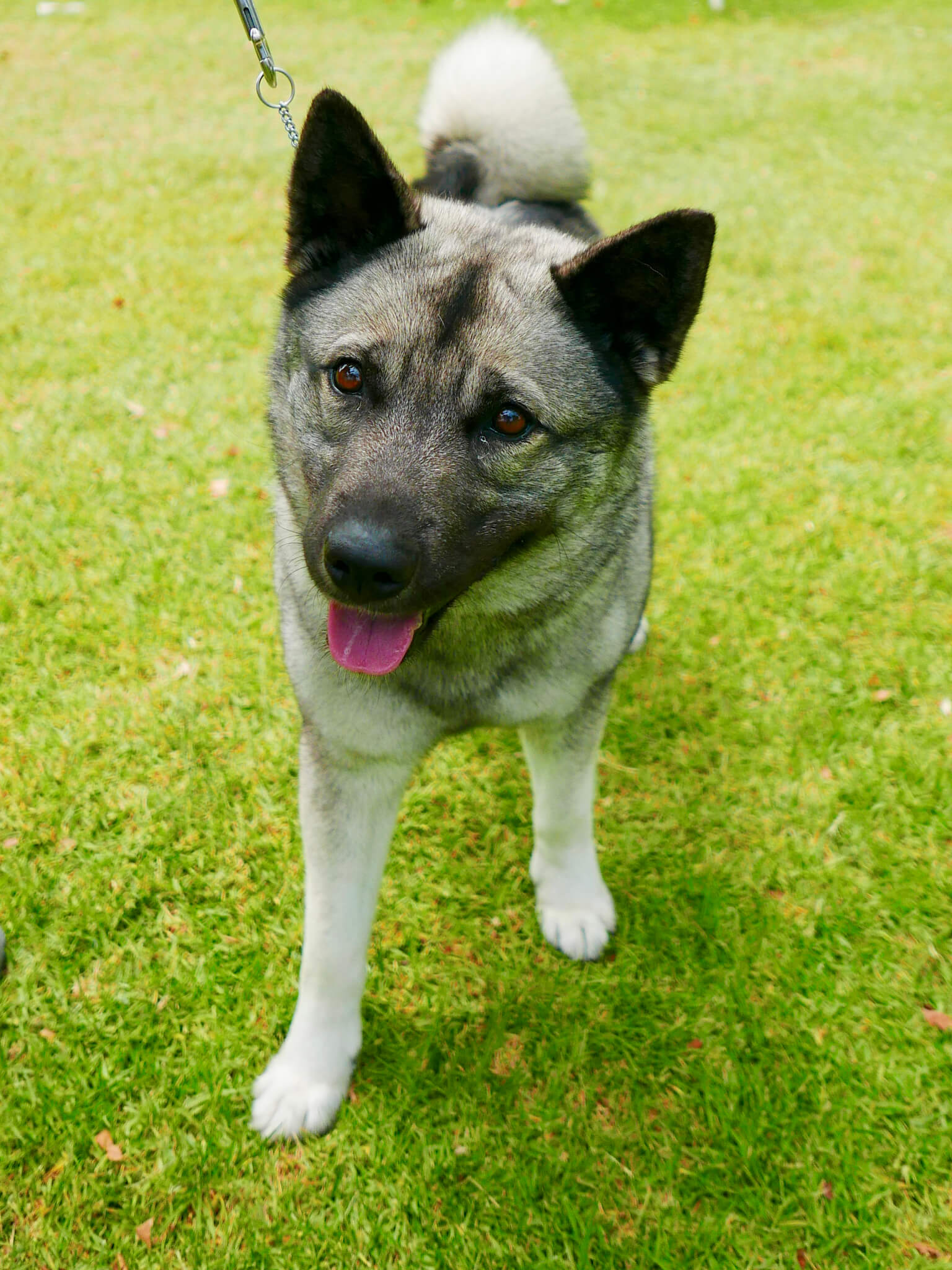


Free Norwegian Elkhound Training Secrets
Free Course on Norwegian Elkhound Training & Obedience
Stop All Bad Behavior, Excessive Barking and Biting
Norwegian Elkhound Personality Traits
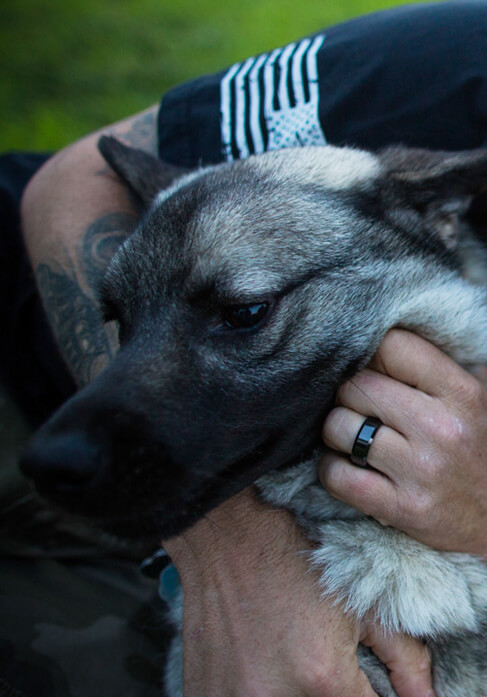
Temperament of the Dog
Norwegian Elkhounds are highly intelligent and require an early start at obedience training to keep their minds active and energy well directed. They can become stubborn if not handled in a consistent and firm but loving manner by their owner.
Most Norwegian Elkhounds are outgoing and friendly towards strangers but may appear aloof initially. They can be frequent barkers, which may be reassuring security-wise for some owners.
They are good with other canines, but only one male should be considered since several males can show aggression. Some are fine with smaller pets but others are not so it is best to be observant of mixing the two until you know your dog's temperament.
The Norwegian Elkhound is a rugged outdoor type, bold and energetic and very adaptable to its surroundings. The breed displays much dignity and character and needs to feel very much part of the family.
The Norwegian Elkhound responds accordingly to love, respect and fair treatment. Excesses in attention will result in an unruly pet. Unfair treatment and harsh discipline will result in negative, destructive behavior.
Its nature can be independent at times so consistent guidance on the owner's part will make this breed a welcome family member.
Better suited to an indoor or outdoor lifestyle?
The Norwegian Elkhound can make a good apartment pet if walked daily and allowed to exercise freely on occasion. They can be frequent barkers if not trained early, so keep this in mind when considering the breed.
Anyone choosing a northern breed like the Norwegian Elkhound should be considerate of their origin and respect their need for the outdoors. Since they were bred to be outside most of the time, they will appreciate lying in the yard, enjoying the elements, especially if that includes a snow mound! If your climate is warm and humid, be aware that your Norwegian Elkhound will want to spend a great deal of time in the air conditioning.
Are they suited to homes with kids?
The Norwegian Elkhound is a most lovable pet for children and enjoys their activities almost as mush as they do. They are protective by nature and are quite tolerant of children and their play. They can become excited at times by this and may try to herd the participants to restore order. The excitement may set them to barking.
Norwegian Elkhound Activity Level
How Active is the Breed?
The Norwegian Elkhound is a very energetic dog that thrives on strenuous activity. They need to be taken on a daily, long, brisk walk or jog. Elkhounds should have at least an hour of exercise a day. They will enjoy running beside your bike or having a really good run in the woods, but remember that these dogs like to roam, so if he picks up an interesting scent, he may ignore you when you call him.
How Much Exercise Does the Dog Need at every stage of its Life?
Puppies of this breed need the usual catch, fetch and tug-of-war ritual to keep them exercised and happy. Lead training early is also good for their active minds and growing bodies.
An hour of exercise a day is not extreme for this breed as it matures and can be met by walking and jogging. The Norwegian Elkhound makes a good agility dog and if your climate allows it, this can be a great form of exercise year round.
Grooming
Specific grooming requirements are needed for this double-coated, seasonally shedding breed. It should be brushed regularly, with extra care given while the dog is shedding its dense undercoat. When the dog is shedding, the dead hair clings to the new hair. The dead hair should be removed with a rubber brush or a wooden comb with a double row of metal teeth. Frequent brushing during times when the coat is not shedding are important as well, and a once a month nail clip will keep feet in shape.
Professional care 2 times a year may be needed to remove the dense undercoat.
Because of this coat, they rarely have a doggy order and they repel dirt and water. Over-bathing should be avoided as it removes the protective oils.


Free Norwegian Elkhound Training Secrets
Free Course on Norwegian Elkhound Training & Obedience
Stop All Bad Behavior, Excessive Barking and Biting
Health and Care
Genetic Problems
Hip dysplasia and certain skin conditions can occur in this breed. Care should be taken to feed your Norwegian Elkhound appropriately as rapid weight gain can be a health threat as well. A consistent exercise program for your pet will help support a good diet and keep his weight in proper proportion.
Breeding the Dog and any Cautions
Your breeder should be consulted on what mate would be a good match for your Norwegian Elkhound.
Life Span: 12-15 Years
National Breed Clubs
National Breed Clubs
British – Norwegian Elkhound
Association of Great Britain – www.necgb.org.uk
US – Norwegian Elkhound Association of America
- www.neaa.net
Other Recognition: CKC, FCI, AKC, UKC, KCGB, CKC, ANKC, NKC, NZKC, APRI, ACR
Rescue Link: http://www.neaa.net/rescue.shtml
Group: Hound Group
AKC Popularity Ranking: 97
Also Known As: Elkhound.
Train Your Norwegian Elkhound To Listen To You
Get Instant Access to Your Training Now - For Free
Sign up for our Free Norwegian Elkhound Mini Course to have a housebroken, obedient dog that happily comes to you every time you call.
You'll learn new commands to obedience-train your dog as well as how to housebreak your dog in 6 days or less.
You'll also learn how to eliminate bad habits like barking, nipping or biting, jumping, or pulling on the leash.Here's just s small fraction of what else you'll learn in the course:
How to lead and think like a pack dog - the new psychology.
3 dangerous mistakes that most Elkhound owners make when they are trying to potty train their dogs.
The 2 main reasons why your dog barks excessively and how to control its excessive barking.
How to obedience train your Norwegian Elkhound to permanently end behavioral problems like Jumping, Aggression, Pulling on Leash.
A surprisingly easy way to teach your dog cool new tricks.
How to improve your dog's lifespan and keep it from getting overly heavy with a healthy and nutritious diet.
Getting Pro help fast - how to get access to our expert trainers when you need them most.
One hidden psychological trigger that all Norwegian Elkhounds have... that practically allows you to "analyze" and "control" your dog's every action.
Priority access to the free online seminars conducted by our training experts.
Whereas other dog training related web sites and books offer generic information for dogs in general, ours is the ONLY web site that offers Elkhound information specifically, from a renowned panel of experts - because as you probably know, Elkhounds have their own special training requirements that other dogs don't have.
Our Dog Experts
The Norwegian Elkhound training information you will read here was developed by a panel of renowned dog training experts whose combined wisdom represents nearly 100 years of specialist experience training dogs.
Here are a few of our experts:




